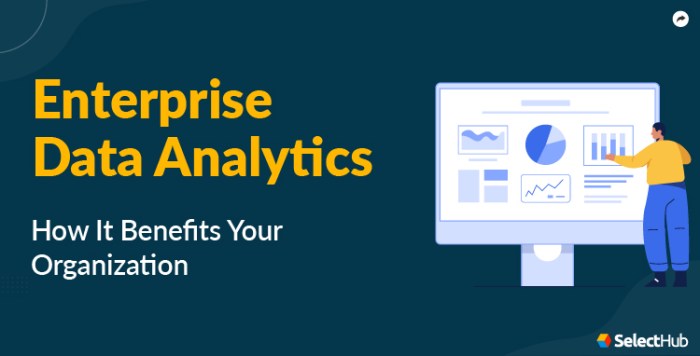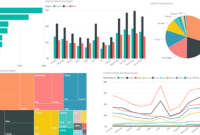Enterprise data analytics is a powerful tool transforming the way businesses operate, providing valuable insights for informed decision-making and strategic planning. In today’s competitive landscape, harnessing the potential of data analytics is essential for staying ahead.
As we delve deeper into the realm of enterprise data analytics, we uncover a world of possibilities where data-driven strategies drive success and innovation.
Introduction to Enterprise Data Analytics
Enterprise data analytics refers to the process of examining large volumes of data within an organization to uncover insights, patterns, and trends that can help drive strategic decision-making. By leveraging various tools and techniques, businesses can extract valuable information from their data to gain a competitive edge in the market.
Importance of Enterprise Data Analytics
Enterprise data analytics plays a crucial role in modern businesses by enabling them to:
- Identify new opportunities for growth and innovation based on data-driven insights.
- Optimize operational efficiency by streamlining processes and identifying areas for improvement.
- Enhance customer experience by personalizing interactions and anticipating needs.
- Mitigate risks and fraud through predictive analytics and anomaly detection.
Examples of Enterprise Data Analytics in Action
Many companies across various industries use enterprise data analytics to make informed decisions. Here are some examples:
- A retail company analyzes customer purchase history to create targeted marketing campaigns and promotions.
- A healthcare provider uses predictive analytics to forecast patient admissions and allocate resources effectively.
- An e-commerce platform tracks user behavior to recommend products and improve the overall shopping experience.
Benefits of Enterprise Data Analytics

Implementing enterprise data analytics solutions comes with a myriad of advantages that can significantly impact a company’s performance and decision-making processes. By harnessing the power of data, organizations can drive innovation, improve efficiency, and stay ahead of the competition.
Enterprise data analytics can lead to significant improvements in various aspects of a business. Let’s explore some real-world scenarios where the implementation of data analytics solutions has proven to be transformative:
Improved Decision Making
- By analyzing data from various sources, organizations can make informed decisions based on insights rather than assumptions.
- Real-time data analytics allows for quick adjustments to strategies and operations, leading to better outcomes.
Enhanced Operational Efficiency
- Identifying inefficiencies and bottlenecks in processes through data analytics can streamline operations and reduce costs.
- Automation of repetitive tasks and predictive analytics can optimize resource allocation and improve overall productivity.
Personalized Customer Experiences
- Utilizing data analytics enables organizations to tailor products and services to individual customer preferences, leading to increased satisfaction and loyalty.
- Segmenting customer data allows for targeted marketing campaigns that yield higher conversion rates and ROI.
Tools and Technologies for Enterprise Data Analytics

Enterprise data analytics relies on a variety of tools and technologies to process and analyze large volumes of data efficiently. These tools play a crucial role in helping organizations derive valuable insights and make informed decisions based on data-driven analysis.
When it comes to BI technologies , businesses are constantly seeking ways to improve data analysis and decision-making processes. One of the key components in this field is the use of BI data tools , which help in gathering, storing, and analyzing large sets of data. To visualize these insights effectively, companies often rely on BI dashboards software that offer real-time updates and customizable features.
Popular Tools and Technologies
- 1. Hadoop: An open-source framework for distributed storage and processing of large data sets.
- 2. Apache Spark: A fast and general-purpose cluster computing system for big data processing.
- 3. SAS: A software suite used for advanced analytics, business intelligence, and data management.
- 4. Tableau: A data visualization tool that helps in creating interactive and shareable dashboards.
- 5. QlikView: Business intelligence and data visualization software that allows for interactive analysis of data.
Comparison of Software Solutions, Enterprise data analytics
When it comes to choosing the right software solution for enterprise data analytics, organizations need to consider factors such as scalability, ease of use, integration capabilities, and cost. Here is a comparison of some popular software solutions:
| Software | Advantages | Disadvantages |
|---|---|---|
| Tableau | Highly intuitive and user-friendly interface | Can be expensive for large-scale deployments |
| Apache Spark | Fast processing speed and in-memory computing | Steep learning curve for beginners |
| SAS | Robust analytics capabilities and advanced statistical functions | Proprietary software with licensing costs |
Role of Artificial Intelligence and Machine Learning
Artificial intelligence (AI) and machine learning (ML) are revolutionizing enterprise data analytics by enabling automated data processing, predictive analytics, and real-time insights. These technologies help in identifying patterns, trends, and anomalies in data that can be used to drive business decisions and improve operational efficiency.
Challenges in Implementing Enterprise Data Analytics
Implementing enterprise data analytics comes with its own set of challenges that organizations need to address in order to maximize the benefits of data-driven decision-making. These challenges can range from technical issues to organizational barriers that hinder the successful implementation of data analytics initiatives.
Data Quality and Data Governance
Ensuring data quality and establishing robust data governance frameworks are crucial components of successful data analytics initiatives. Without high-quality data that is accurate, reliable, and consistent, organizations may face challenges in deriving actionable insights from their data. Data governance helps in ensuring data security, compliance, and the overall integrity of the data being used for analytics purposes.
- Poor Data Quality: Inaccurate, incomplete, or outdated data can lead to misleading insights and incorrect decision-making.
- Lack of Data Governance: Without clear data governance policies and processes in place, organizations may struggle with data security, privacy, and compliance issues.
- Data Silos: Disparate data sources and siloed data repositories can hinder the integration and analysis of data across the organization.
- Data Integration Challenges: Integrating data from multiple sources and formats can be complex and time-consuming, leading to delays in data analytics projects.
Trends in Enterprise Data Analytics

Data analytics in the enterprise world is constantly evolving, with new trends shaping the way organizations harness the power of data to drive decision-making and strategy. Let’s delve into some of the emerging trends in enterprise data analytics that are reshaping the landscape.
Predictive Analytics
Predictive analytics is one of the key trends in enterprise data analytics, enabling organizations to forecast future outcomes based on historical data patterns. By leveraging advanced algorithms and machine learning techniques, predictive analytics empowers businesses to anticipate trends, identify risks, and make proactive decisions to stay ahead of the curve.
Prescriptive Analytics
Prescriptive analytics takes predictive analytics a step further by not only predicting future outcomes but also recommending the best course of action to achieve desired results. This trend is gaining traction in enterprise data analytics as organizations seek to optimize processes, improve efficiencies, and drive innovation by leveraging data-driven insights to make informed decisions.
Impact of Big Data and IoT
The proliferation of big data and the Internet of Things (IoT) is revolutionizing enterprise data analytics strategies. The sheer volume, velocity, and variety of data generated by IoT devices combined with big data sources present both challenges and opportunities for organizations. By harnessing the power of big data and IoT, businesses can gain valuable insights, enhance operational efficiency, and unlock new revenue streams.
Future of Enterprise Data Analytics
The future of enterprise data analytics is bright, with advancements in artificial intelligence, machine learning, and automation poised to revolutionize how organizations extract value from their data. As businesses continue to embrace digital transformation and data-driven decision-making, the role of enterprise data analytics will become increasingly critical in driving innovation, competitiveness, and growth in the rapidly evolving business landscape.
In conclusion, enterprise data analytics is not just a trend but a fundamental pillar of modern business operations. By leveraging data effectively, companies can unlock new opportunities, drive growth, and stay ahead of the curve in an ever-evolving market.
When it comes to BI technologies , businesses are constantly seeking innovative solutions to analyze and interpret data effectively. This is where BI data tools play a crucial role in streamlining processes and extracting valuable insights. Additionally, implementing BI dashboards software can enhance visualization and decision-making for better business performance.




